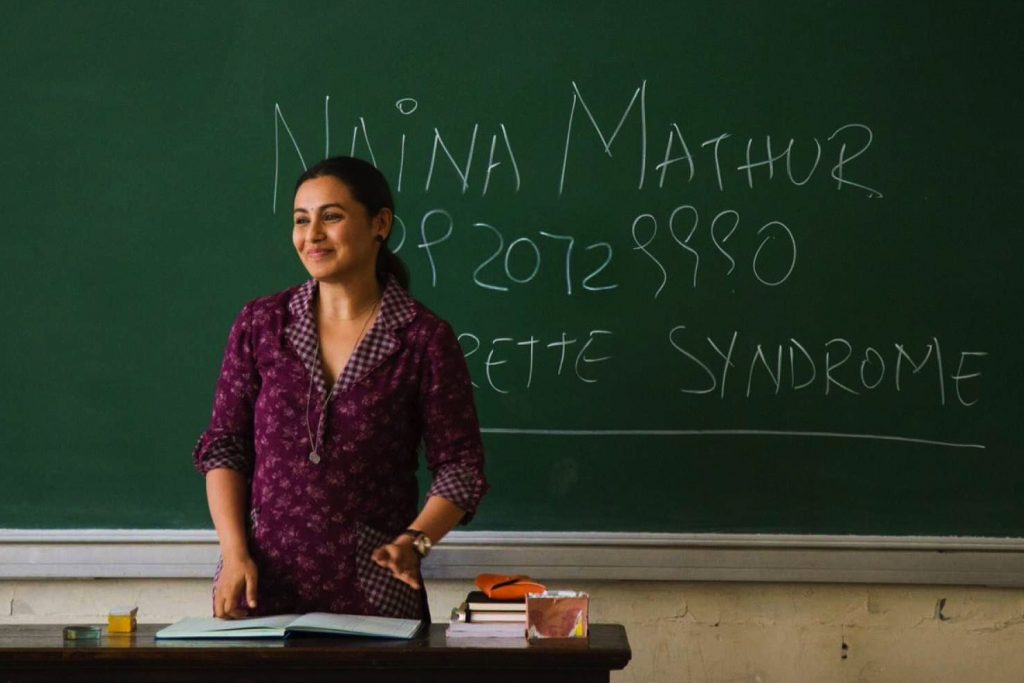With Hichki, Rani Mukerji proves that she needs to be seen on the big screen far more often. She is superb as always and ably carries the film, the first in India dealing with Tourette Syndrome, on her shoulders. The film, taking off from Front Of The Class, based on the true life of Brad Cohen, however, gets bogged down as from a promising beginning, it enters highly clichéd territory, already seen many a time before in Blackboard Jungle (1955), To Sir With Life (1967), Dangerous Minds (1995), Imtihan (1974) and others of the genre.
In Hichki, Rani plays a young woman with Tourette Syndrome, Naina Mathur, who is finally hired to teach at a convent school after much rejection due to her affliction. Her students? A group of 14 youngsters of class 9F from the ‘basti’ on the wrong side of the tracks and whom no one really cares about. As a result, they are rebellious and impossible to control, studying at this ‘elite’ school only due to the Government’s right to education scheme. No doubt, Hichki aims to be uplifting and inspiring, but its superficial treatment, mawkish sentimentality, emotional manipulation and a high level of predictability bring the film down. So yes, Naina first faces the ire and pranks of the students, then reaches out to them, breaking through with some TLC and unconventional teaching methods, before finally triumphing along with them by the film’s end.
While the film does have a couple of genuine lump-in-the-throat moments as a film of this genre inevitably would, it also has its share of hiccups besides the tics that affect Naina’s character. The screenplay is at times forcefully contrived, rather simplistic, and all too convenient. It is almost as if the makers have a standard check list for a film of this type and tick off each trope as it occurs faithfully. The inter-character dynamics and the issues at hand – Tourette Syndrome, the Indian education system, triumph of the underdogs – all needed far more depth as did the fleshing out of the supporting cast, good though they are. The film also overplays its emotional card and repeatedly underlines its emotional highs with a typically uplifting and obtrusive background score. And though the film is just under two hours, it’s length tells towards the end with the epilogue twenty odd years later appearing highly forced in an effort to desperately wring out even more emotion and tears.
Still, Rani lifts the film a notch with her fine rising-above-the script performance. Her Naina, with tics, barks and all, has perseverance, determination, self-respect, empathy, spunk and no self pity whatsoever. She captures every shade of her character perfectly, while balancing the fine line of being too good to be true. However, one misses her character’s more difficult and more introspective moments for us to truly feel for her and go along with her. Neeraj Kabi is fine enough as the teacher who opposes Rani and her noble efforts at every level, while the group of children are well cast and believable. Supriya Pilgaonkar as the supportive mother and her real life husband, Sachin, as the man who abandoned the family both suffer from rather sketchy characterizations.
Technically, one must mention Avinash Arun’s simple yet evocative camerawork. However, the songs don’t quite work as a desi version of black youngsters and their gangsta rap and neither does the typically overblown background score. All in all, it’s finally Rani Mukerji’s show more than anything else. And she rocks. We desperately need to see her more frequently on the silver screen but more importantly, we also need to see her in better films.
Hindi, Drama, Color


